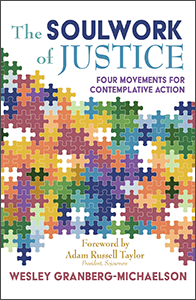Retired General Secretary of the Reformed Church in America and chair of the board of Sojourners, Wesley Granberg-Michaelson, writes from years of work at the intersection of faith and public life about how critical it is to nurture spiritually saturated roots for what he calls the “soulwork of justice.”
Challenging times such as ours call for the “soulwork of justice.” To do this holy work, we must nurture spiritually saturated roots to sustain this steadfast witness and work for God’s justice. Here are eight ways your inward grounding for your outward witness can make a difference.
1. You know this world belongs to God.
The extremes on the religious right and the secular left share a common assumption: this world is controlled by hostile, evil forces. That starting point begins with a binary view of reality, making certainty and self-righteousness nearly absolute.
But you can begin differently, with the clear conviction that this world belongs to God. We are upheld by limitless love desiring to shape the essence of the world’s life. None of this minimizes the gravity of the threats to human flourishing and planetary sustainability. It’s the roots of your response, however, that make all the difference.
The grounding of your life, at the center of your being, in God’s expansive love, connects you to God’s beloved embrace of the world. From that starting point you confront the evil which besieges us and are sustained by a hope that truly does conquer fear.
2. Your engagement with the world has a spiritual foundation.
The injustice and cruelty we confront have economic, political, and social dimensions requiring deep change. Yet, if you are a contemplative or a prophet, you know that there is more involved. The idolatries enshrining injustice, brutal military violence, climate destruction, and the violation of human dignity have a corporate spiritual dimension. Their hold reaches into the hearts and minds of those wielding power.
You need not make an either/or judgment about political change and spiritual transformation. But know that movements for a liberating future include a radical transformation of values and attitudes requiring spiritual power. You should be prepared for that level of engagement.
3. You act on the basis of call.
Calls to action addressing urgent causes resound and rebound within spaces devoted to social change and justice. How do you decide what to do?
During my early pilgrimage with Church of the Saviour in Washington, D.C., I first heard the language about acting in response to “call.” It’s the expectation that a disciplined inward journey results in clarity about where your outward work and witness should be directed.
You will find it nearly impossible to prioritize the direction of your outward call by trying to decide what is most urgent. Imagine discovering your outward journey, where you pour out your committed energy, to emerge from an inner holding space allowing you to listen and hear God’s call. That will center you with resolute clarity and a wellspring of strength.
4. Your action is steadfast, committed to the long term.
Facing the urgency of escalating threats, you want to see results. But your time frame of expectations can become constricted, riveted to election cycles. And disillusionment can readily capture your soul.
Your inward journey can liberate your expectations from pragmatic expediency. That’s crucial for strengthening the steadfastness of your commitment. If you are called by God to your outward journey, you are likely to be directed toward goals which, in practical timelines, seem nearly impossible.
Your confidence in the holy significance of your action comes not from any short-term results, but from the attachment of your soul to the power of God’s love for this world. You will be there for the long term, with the necessary combination of urgency and patient hope.
5. You display resilience.
Your commitment to change drives a need to control outcomes. But your goals are linked to God’s desired outcomes for a beloved world. You’re seeking deep, radical change, imperative for ushering in fresh ways for human communities and the earth to flourish rather than perish. That’s not easily reduced to measurable, immediate quantifiable outcomes.
Sure, you will always be attentive to the impact of what you do. But don’t become dependent on the standard measurements of success and failure. More is out of your control than you normally imagine.
Resilience is the most valuable gift you can offer to the movements and actions which God has called you to. Your capacity to stay grounded and engaged with unquenchable hope is what will matter most. You see that quality in the lives of all those known for leading transformative social movements.
6. You detach from your ego.
If you are a change maker, reformer, activist, community leader, pastor or priest, your healthy detachment from an ego-centric imprint on what you achieve is essential. In the end, it’s not about you. Privately desiring to see your name in lights will dim the cause and calling you have discerned from God.
Your commitment to an inward journey, with regular and well-curated spiritual practices, can allow you to face and defuse the power of your shadow side. You’ll be able to distill the fruits of your actions from the thirst of your ego. And that will make a difference.
Others will trust you more deeply when they see that your focus for justice is faithfully and fearlessly riveted to God’s transforming work in the world, and not on mislaid attention trying to portray your indispensable role in that process.
7. You don’t demonize your opponents.
One of the most difficult tasks you (and I) face is holding fast to the prophetic urgency of your call, while maintaining an open heart toward your opponents. Our toxic, polarizing political and cultural environment only intensifies this challenge.
This drives deep into your inner self. Feelings of hatred toward those who are inflicting their enmity and oppression on others lie close to the surface. When justice, peace, and even planetary survival are at stake, your tendency is to attack, humiliate, and destroy your opponents.
However, we’ve heard another voice, echoed in biblical wisdom and exemplified in Jesus. It says that this tempting trajectory of innate reactivity, of an eye for an eye, leads us down a spiral of death. Neither hope nor change can flourish in continual recycling of mutual recrimination and vengeance. Radical, transforming change comes when that cycle is broken. That requires inner work embracing the reality that sees the image of God imbedded, somehow, within every other person.
8. You are “rooted and grounded in love.”
Where do you root your life? It takes courage for you to ask that question honestly. If you don’t, the surrounding culture will answer it for you through its unconscious addiction to money, power, and individualistic glory. You will be subsumed with a false self, entrenched in that lifeless way of living.
Your call is for your inner being to be “rooted and grounded in love” (see Ephesians 3:14-19). And that is a lifelong journey, beginning when you discover, in moments of graced awakenings, that this love has already embraced you. You are rooting your life in the conviction that this love is at the center of all things. This makes a decisive difference in your outward action because this love not only transforms your inner being. It also transforms the world.
 Used by permission of the author whose latest book, The Soulwork of Justice: Four Movements for Contemplative Action, was published last month. It is available from the publisher, Amazon, and Cokesbury.
Used by permission of the author whose latest book, The Soulwork of Justice: Four Movements for Contemplative Action, was published last month. It is available from the publisher, Amazon, and Cokesbury.
Related Resources
- Community Transformation and Justice Require More Than Preaching by Kevin Slayton
- Leading in an Age of Political Polarization by David R. Brubaker
- Faithfully Engage Public Policy featuring Miranda Zapor Cruz — Watch the Leading Ideas Talks podcast video | Listen to the podcast audio version | Read the in-depth interview
If you would like to share this article in your newsletter or other publication, please review our reprint guidelines.






